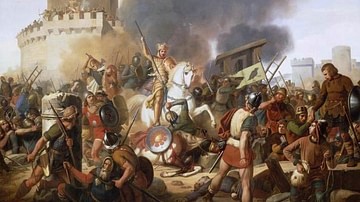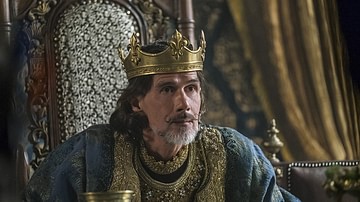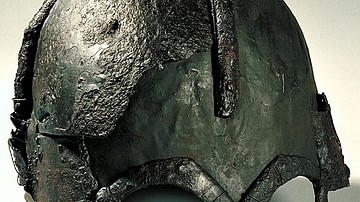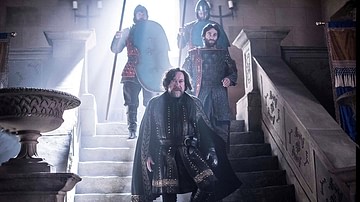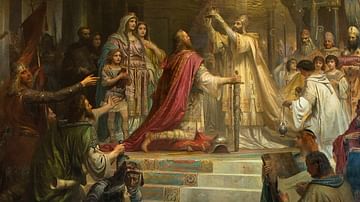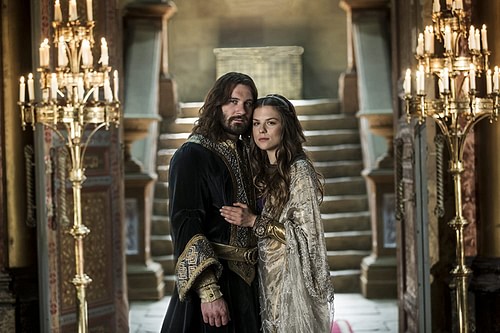
Gisela of France was a legendary 10th-century CE Francian princess, who, according to tradition, was married off to Viking leader Rollo of Normandy. Her name, Gisela or Gisla, comes from an Old German word meaning "to pledge", the French equivalent would be Gisèle. The general consensus among historians is that Gisela of France was born circa 900 CE in the Kingdom of West Francia, at the court of Charles the Simple. Most likely, she was one of the six daughters of the king and his first wife, Frédérune. It is also stipulated that Gisela was married off to Rollo, the founder and first ruler of the region of Normandy, after his conversion to Christianity in 911 CE.
Historical Background
Roughly between the 789 and 1100 CE, the looters and robbers later known as Vikings were the terror of Europe and its surroundings. Their attacks formed a recurring problem for many coastal cities, also in West Francia. This empire, also known by the Latin name of Francia Occidentalis, came into being in 843 CE, with the Treaty of Verdun. Initially Charles II - nicknamed the Charles the Bald - became king of the western part, which included all areas west of a rough north-south line from Antwerp across Mâcon to Nîmes.
From 898 to 922 CE, the area was governed by Charles III (879-929 CE) nicknamed the Simple (not because he was stupid, but because he was always just simple and clear in communication). When the Vikings besieged the Francian city of Chartres, in 911 CE, they were defeated but remained a threat. Charles the Simple then concluded the agreement of Saint-Clair-sur-Epte with the Viking leader Rollo. The location of Saint-Clair-sur-Epte was chosen because it was located in Neustria halfway between Paris and the coast. As part of the treaty, Rollo was loaned the area that would later form the Duchy of Normandy. In return, he would defend access to the Seine from attacks by other Vikings.
Sources
In his Historia Normannorum (written between 996 and 1015 CE), the Norman historian Dudo de Saint Quentin (c. 965 - c. 1043 CE) introduces us to the Francian princess:
… [Rollo] put his hands between the hands of the king, which neither his father, nor his grandfather, nor his great-grandfather had done for any man. And so the king gave his daughter, Gisla by name, to be the wife of that same duke… (2.28, last paragraph).
The princess was thus given away to this Rollo, whose Old Norse name probably was Hrólfr. Dudo also grants the title of “duke” to this famous Viking warrior, even though the title duke (dux) did not come into common usage until the 11th century CE. Princess Gisla is married off to him, in exchange for peace and protection in Francia.
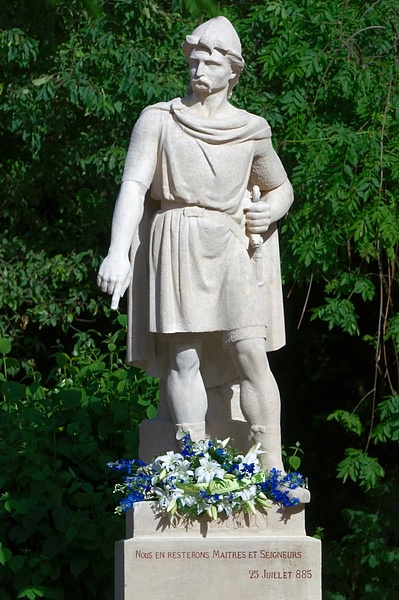
Historicity
While various historical records - like the Historia Normannorum and The Ecclesiastical History of England and Normandy - cite a Gisela as one of the daughters of Charles the Simple and the genealogy of Count Arnulf of Flanders (950's CE) names a Gisla as one of the daughters of King Charles, the absence of historical records written at the time of Gisela's marriage to Rollo mentioning the union questions the legitimacy of the character as well as her existence. Medieval historian Pierre Bauduin believes in Gisla's existence but adds that she could have been only three or four years old at the time of her marriage.
Perhaps this controversy surrounding the existence of Gisela of France can be explained by the fact that none of Charles' children receive much, if any, recognition in historical records with the exception of Louis IV of France. The daughters of Charles the Simple are simply not credited for anything other than being mentioned as his daughters. Rollo is an iconic figure, a semi-legendary Viking-gone-Christian who protected Francia (after 911 CE there are no records of any more Viking raids there). He is celebrated as the great-great-great-grandfather of William the Conqueror, the first Duke of Normandy, and an example of the power of Christianity. But his first wife, Gisela, ended up being of little consequence as far as representation of history went and is left out of official family trees.
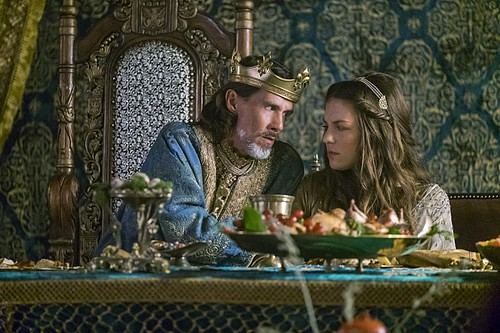
The fact that all the articles and books named above share the above scanty details about the French princess does little to reduce doubts surrounding the existence of the character. Nonetheless, the idea of a “princess Gis(e)la” became rather popular over 11 centuries after her life, due to her presence in two television series: The Last Kingdom and Vikings. Fans of these series have tried to unravel the mystery of Gisela, which added another layer to the confusion surrounding her, mostly by mixing her up with Gisela of Burgundy (c. 955-1007 CE), who was the mother of Emperor Henry II (973-1024 CE) and of Queen Gisela of Hungary (985-1065 CE). She is also often confused with another princess Gisela of France (born c. 819/821 CE), who was the daughter of King Louis the Pious (778-840 CE), the son of Charlemagne, and Queen Judith of Bavaria (797-843 CE). This Princess Gisela of France was married to Eberhard I of Friuli with whom she had children.
Depictions in The Last Kingdom & Vikings
In The Last Kingdom, Gisela is one of the wives of the main character Uhtred of Bebbanburg (based on the historical Uhtred the Bold, who lived a century later). In this series, Gisela and her brother, the later King Guthred of Northumbria, are the children of a Danish jarl who settled in Cumbraland (modern Cumbria). The character of Gisela was invented by author Bernard Cornwell for his Saxon Stories novels.
In Vikings, Gisla is portrayed by the French actress Morgane Polanski (the daughter of Roman Polanski) and married off to Rollo, who is presented as the brother of the famous Viking warrior Ragnar Lothbrok. (Although there is no evidence pointing towards family relations between Rollo and (a) Ragnar, it might have been true that Rollo participated in Viking raids on Paris.) The marriage is fictionalized; Gisla and Rollo have a happy relationship and form a family of five with their children: William, Marcellus, and Celsa. Princess Gisla is presented as the daughter of a “King Charles” who is a combination of three historical West Frankish rulers who all go by the name of Charles. Just like her on-screen father, the character of Gisla is inspired by different historical figures. Her character is based on the tales surrounding princess Gisela of France but also influenced by stories of Poppa/Popa of Bayeux and Jeanne d'Arc (c. 1412-1431 CE).



